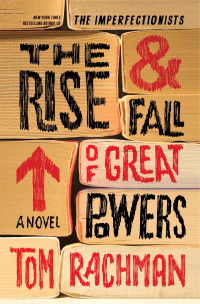The Rise & Fall of Great Powers by Tom Rachman
 Friday, August 15, 2014 at 9:15AM
Friday, August 15, 2014 at 9:15AM 
Published by The Dial Press on June 10, 2014
The Rise & Fall of Great Powers features wonderfully eccentric characters, but this character-driven novel has the added virtue of telling a multi-layered story that combines humor with intrigue while exploring the mysteries that come from knowing (and depending upon) other people. The characters have, to varying degrees, invented their lives and hidden their pasts, or settled on histories that suit them in the moment, sometimes because they do not know the full truth, other times because they want to conceal it.
In 2011, when the novel opens, Tooley Zylberberg has settled down, having purchased a small used bookshop in a small Welch village. It is a quirky shop, the sort that every booklover wants to find, but it earns no income, forcing Tooley to pay her sole employee, Fogg, from her meager savings. Although she is marching toward insolvency, Tooley keeps the place because it makes her feel rooted after living a rootless life. She avoids friendships because friendships require a past ("your past only mattered if others sought to know it") and she would prefer not to have one. Or so she tries to tell herself until an urgent Facebook message sends her flying across the ocean to meet someone in New York, only to cross it again to visit another person from her past in Italy. Her travels prompt her to reinterpret her life and to develop new understandings of the friends who were once part of it.
We learn about Tooley's past (as she understood it at the time) when the novel begins to jump to earlier decades. In 1999, at the age of 20, Tooley's exploration of New York City leads her to a law student named Duncan McGrory. He becomes the new presence in her life, an addition to her current traveling companions: an elderly man with a Russian accent named Humphrey who blames his misfortune on "the Moron Problem" and an affable itinerant Canadian con artist named Venn.
The novel's third time frame begins in 1988 as Tooley leaves Australia and travels to Bangkok with Paul, a contractor who installs modems in small American embassies. There she encounters flighty Sarah, who afterwards continues to drift in and out of her life. The significance of Tooley's time with Paul and Sarah only becomes clear in the novel's last half. In fact, it is only in the closing chapters that Tooley puts the pieces together and begins to understand her life from a new perspective.
The novel's fragmented structure allows intrigue to build as the reader watches and anticipates the reconstruction of Tooley's life. By emphasizing the relative nature of time, the novel suggests that memory is a form of time travel and raises the possibility that we change the past whenever we visit it. In a related passage that I loved, the novel argues that readers keep their books because they contain our past, "the texture of being oneself at a particular place, at a particular time, each volume a piece of one's intellect."
Apart from its thoughts about time and memory, The Rise & Fall is largely about the fictions that people make of their lives and the difficulty of piercing the fictions of others. As Humphrey says: "Nothing, not even dictionaries, can tell you what anything means. The reality of things is just sad, for the most part." And if reality is sad, inventing a happier version of your life is a way to cope. Yet when memories, in their retelling, "chip loose from the events themselves," detaching the present from the reality of the past, isolation can be the consequence of dishonesty. And while it may be impossible to penetrate the fictions of others, the novel wisely suggests that the key to understanding people lies is accepting "that to be surprised or disappointed or even betrayed [is] not a catastrophe." All of that is nutritious fruit to chew upon.
The opinionated characters in The Rise & Fall cover vast ground in their amusing conversations, from political systems to the myth of meritocracy, from the benefits of having faith in human beings to the advantages of living apart from them, from the perils to the joy of nonconformity. Some chats are silly, others are profound, all contribute to the eager turning of pages. Graceful prose, unpredictable characters, startling humor and rich insights into human nature make The Rise & Fall of Great Powers a true pleasure to read.
HIGHLY RECOMMENDED
 TChris |
TChris |  Post a Comment |
Post a Comment |  HR,
HR,  Tom Rachman in
Tom Rachman in  General Fiction
General Fiction 


